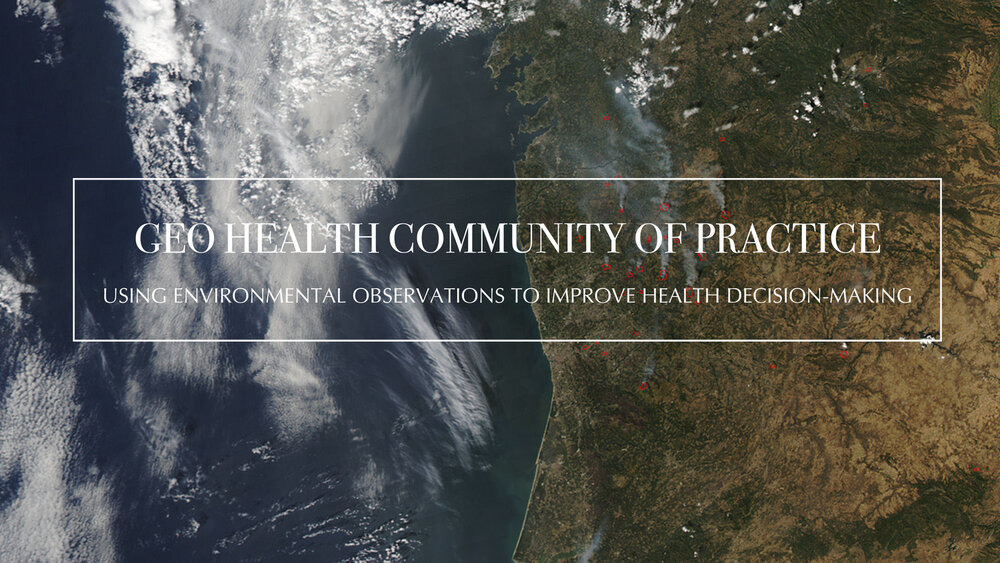Health Community of Practice supports student engagement

The GEO Health Community of Practice (CoP) supports ongoing GEO youth engagement activities for integrating Earth observations in public health applications. The voices and actions of global youth can offer innovative perspectives that propel culturally appropriate, nature-based solutions to combat complex emerging health challenges. Through these efforts, CoP leadership uses the One Health concept to guide youth engagement in Science, Technology, Engineering, and Math (STEM) disciplines (202203_draft_youth_cop_tor.pdf and encourage cross-cutting collaborations to fill knowledge gaps and drive action to the 2030 Agenda for UN Sustainable Development Goals (SDGs).
Over the past three years, CoP leadership has showcased the robust data science projects of the Rensselaer Polytechnic Institute (RPI), as part of the National Aeronautics Space Administration (NASA)-Oak Ridge National Laboratory (ORNL)-RPI Student Engagement (http://www.geohealthcop.org/studentengagement). Under this engagement framework, RPI faculty (Thilanka Munasinghe) and NASA and ORNL data scientists (Assaf Anyamba, Heidi Tubbs, Bhaskar Bishnoi) provided datasets and problems sets, and offered guidance to RPI students in Data Analytics, Data Science, and Xinformatics (Informatics) courses in their semester-long projects.
This NASA-ORNL-RPI Student Engagement allowed students to immerse themselves in the intricacies of various NASA data products and applications, granting them the practical skills and knowledge needed to tackle pressing global challenges and addressing some of the world's most urgent GEO health matters that are arising from vector-borne diseases and other environmental health topics.
Specifically, four projects highlighted the breadth of Data Science, Data Analytics, and Xinformatics course applications, including:
- Ethan Joseph (Computer Science major) led the project entitled, Scraping Unstructured Data to Explore the Relationship between Rainfall Anomalies and Vector-Borne Disease Outbreaks(https://ieeexplore.ieee.org/document/9671853), which was presented at the 2021 IEEE International Conference on Big Data.
- Jonathan Harris (Computer Science major) directed the project entitled, Predicting Crimean-Congo Hemorrhagic Fever Outbreaks via Multivariate Time-Series Classification of Climate Data(https://dl.acm.org/doi/10.1145/3545729.3545772), which was highlighted at the Proceedings of the 6th International Conference on Medical and Health Informatics.
- Ajeet Parmar (Computer and Systems Engineering/Computer Science major) finalized the project entitled, 2021 Monthly Rice Production in Chinese Coastal Provinces(https://ieeexplore.ieee.org/document/9907717), which was shared at the 2022 3rd International Conference on Big Data Analytics and Practices.
- Vasundhara Acharya (Computer Science major), Anindita Ghosh (Electrical, Computer, and Systems Engineering major), and Inwon Kang (Compucter Science major) completed the project entitled, Landslide Likelihood Prediction using Machine Learning Algorithms (https://ntrs.nasa.gov/citations/20220017729), which was exhibited at the 2022 IEEE International Conference on Big Data.
Faculty mentors highlighted that RPI undergraduate students were academically prepared to pursue these complex data science projects. However, they noted that direct mentorship and regular progress meetings were key to ensure that students acquired technical skills in Earth observation data and metrics and became familiar with specific data sets to analyze a specific problem set and execute data treatment plans. As GEO members support youth engagement activities through specialized training of the next generation of scientists, students will gain valuable skills for their academic degree and prepare themselves for graduate school and other career opportunities. Overall, these students are getting a head start in understanding the details that research entails, professional writing skills, and preparation for graduate school and career opportunities in STEM disciplines.
As GEO members support youth engagement activities through specialized training of the next generation of scientists, students will gain valuable skills for their academic degree, including understanding the details that research entails and professional writing skills. This training will give them a head start in their preparation for graduate school and career opportunities in the STEM disciplines.